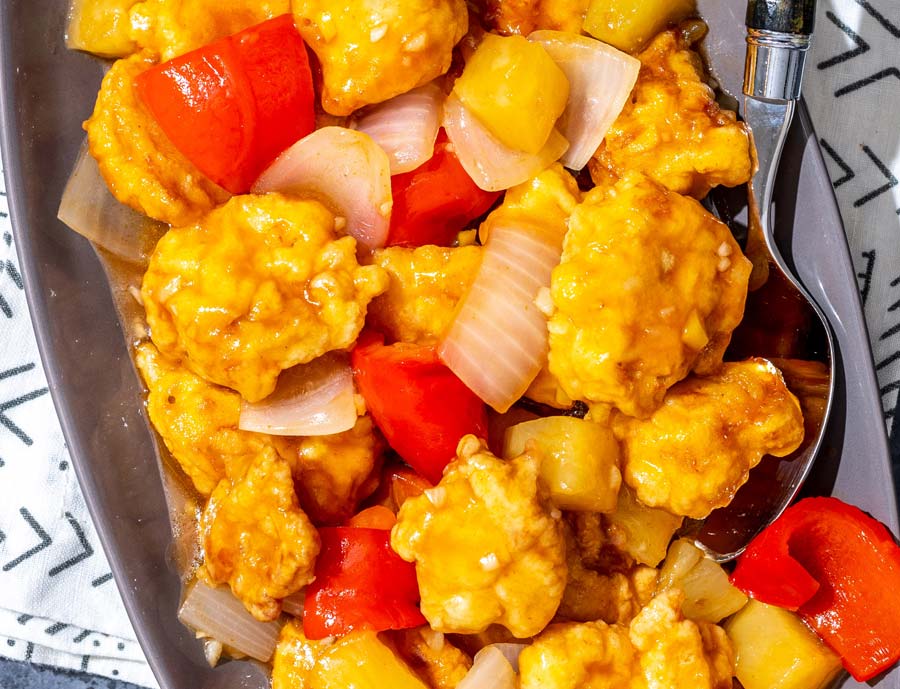 Laura Chase de Formigny for The Washington Post
Laura Chase de Formigny for The Washington Post
Nearly a decade into my marriage, one such change sticks out: sweet and sour chicken.
There is a lot, food-related and otherwise, that my husband and I agree on, but sweet and sour chicken, the iconic Chinese-American takeout dish, is not one of them. You know the type - typically very heavily battered, very sweet and very, very red. Because I can understand why those attributes don't appeal to everyone, and because I prefer to eat our takeout family-style and order dishes we'll both eat, I pretty much cut sweet and sour chicken out of my repertoire. Like I said, sacrifices.
I have tackled at-home versions of pad thai, fried rice and butter chicken, and sweet and sour chicken seemed like an ideal next candidate. I remembered a very good recipe from former catering kitchen cook Sheila Chang that I made once, years ago, and set about testing it and a few other contenders.
That recipe was a crowd favorite based on the flavor and texture of the sauce. Cookbook author Diana Kuan's recipe earned plaudits for its more restrained, citrusy sweetness (almost more like an orange chicken) and relatively thin but satisfying coating of batter. A lot of restaurant versions have so much batter that you lose the chicken. Not this one.
I pursued a hybrid version, with a scaled-back version of Chang's recipe - less chicken with less sauce, made with less sugar - and Kuan's batter. As to that batter, yes, we thought it was key to the spirit of the takeout classic. Of course, you can cook the plain chicken and then add the sauce, like a more traditional stir-fry. But this is an easy shallow fry that only uses 1 1/2 to 2 cups of oil, for a 10- or 12-inch cast-iron skillet. The coating of batter provides something for all that delectable sauce to cling to, although a nice bowl of rice helps with that, too.
In the end, my tinkering paid off. My tasters lapped it up, down to every last drop of sauce, which strikes a great balance between the sugar and vinegar. No, it's not faster than takeout, although at less than an hour, I think the effort is worth it, especially if you have some sweet and sour skeptics to placate. Like my (extremely agreeable and generous) husband. Now that I have found my new go-to recipe, this might be the time to try to win him over.
![]()
TAKEOUT-STYLE SWEET AND SOUR CHICKEN
SERVINGS: 4 to 6
Recipe notes: If you have a wok, you may use it for frying and assembling the final dish. You'll need an instant-read thermometer for frying.
White-meat chicken may be substituted for the thighs.
The dish is best when freshly made, although we were more than happy to eat leftovers reheated in the microwave.
Ingredients
FOR THE CHICKEN
- 2 large eggs, beaten
- 1/4 cup cornstarch
- 1/4 cup flour
- 1/2 teaspoon kosher salt
- 1 pound boneless, skinless chicken thighs, cut into 1-inch pieces (see headnote)
- 2 cups canola oil
FOR THE SAUCE
- 2 tablespoons canola oil
- 2 medium cloves garlic, smashed, then minced (scant 1 tablespoon)
- 2 thin slices peeled ginger root, cut into matchsticks, then finely chopped (1 tablespoon)
- 1 large red bell pepper, stemmed, seeded and cut into 1-inch pieces 1/2 medium onion, cut into 1-inch pieces (about 1/2 cup) 3/4 cup water, plus more for the cornstarch slurry
- 1/2 cup canned pineapple chunks, plus 6 tablespoons of juice from the can (from one 8-ounce can; do not use pineapple chunks in heavy syrup)
- 1/3 cup seasoned rice vinegar
- 1/4 cup sugar
- 2 tablespoons ketchup
- 1 tablespoon cornstarch
Steps
Make the chicken: In a medium bowl, stir together the eggs, cornstarch, flour and kosher salt. The batter should be liquidy enough to coat the chicken. If the batter looks too dry, add 1 to 2 tablespoons of water and stir again. Add the chicken and stir gently to coat. Let stand at room temperature for about 10 minutes.
Meanwhile, in a 12-inch cast-iron skillet over medium heat, warm the 2 cups canola oil to 350 degrees. Working in 2 or 3 batches, add the chicken and fry until golden brown on the outside and cooked through, 4 to 5 minutes per batch, turning the pieces over halfway through. Using a slotted spoon or skimmer, transfer the chicken to a baking sheet lined with paper towels.
Make the sauce: In a 12-inch nonstick skillet over medium-high heat, warm the 2 tablespoons of oil until shimmering. Add the garlic and ginger and stir-fry just until fragrant (do not let the garlic burn), about 1 minute, then add the pepper and onion, stirring to coat. Cook for 1 to 2 minutes (do not let the onion take on color), then add the 3/4 cup water, the pineapple and its juices. Once the mixture comes to a boil, add the vinegar, sugar and ketchup and cook, stirring to form a red sauce.
In a small bowl, whisk together the cornstarch with 1 to 2 tablespoons water (just enough to form a slurry), then stir it into the sauce, which should thicken almost immediately. Add the cooked chicken and stir to coat the pieces evenly. Remove from the heat, transfer to a platter and serve.
Nutrition (based on 6 servings) | Calories: 300; Total Fat: 14 g; Saturated Fat: 2 g; Cholesterol: 135 mg; Sodium: 400 mg; Carbohydrates: 27 g; Dietary Fiber: 5 g; Sugars: 14 g; Protein: 17 g.
JewishWorldReview.com publishes delicious -- mostly nutritious -- recipes. Sign up for the daily JWR update. It's free. Just click here.
(COMMENT, BELOW)


 Contact The Editor
Contact The Editor
 Articles By This Author
Articles By This Author